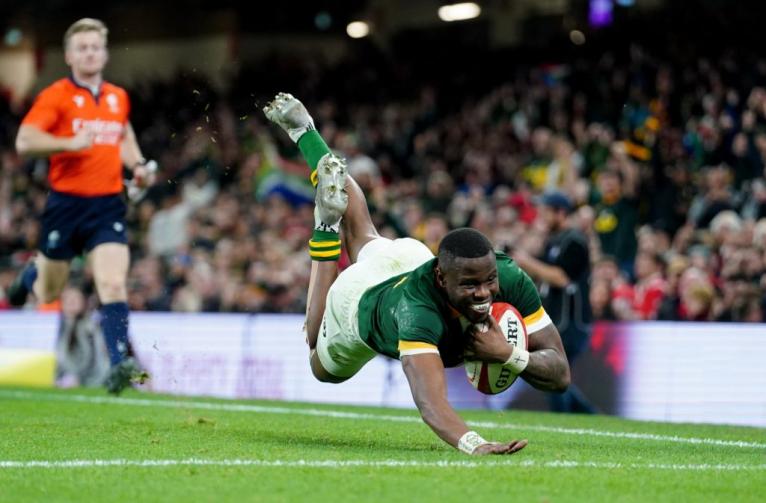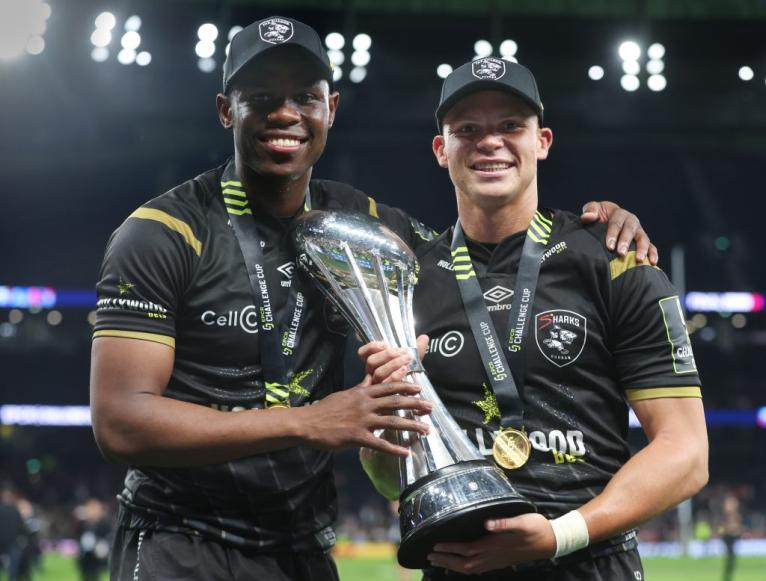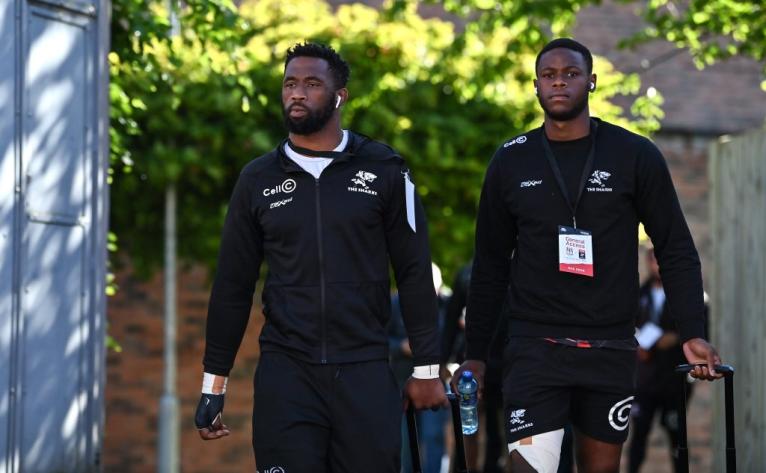Aphelele Fassi speaks a lot about darkness. The black pit which swallowed him up for two seasons since his rocket-propelled ascent to the Springbok team. The anxiety and the doubt. The fatigue and frustration. The successive injuries which put him out for months at a time. An athlete of such boundless verve and colour, mired in the gloom. The name Aphelele means ‘fulfilled’ and for some time, it read like a cruel irony, as though the Sharks tyro was destined never to realise his vast potential.
After searing on to the Test stage three years ago, a quicksilver full-back with a deadly break, his form faltered and his game was torn apart. Jacques Nienaber dropped him mid-series when Wales fetched up in July 2022. He would not win another cap for two years. He was reckoned flaky in the air. Weak in defence. A rapier with the ball, no question, but a soft touch without it. Worse still, Fassi’s attitude was questioned – the ultimate insult to the professional player. He was given the nickname ‘Weekend Special’ after a song written by the late anti-apartheid artist Brenda Fassie. The moniker stems from their similar surnames and Fassi’s stunning feats come Saturday afternoon, but stoked a narrative he was only interested in performing when the big occasions rolled around.

As he festered in the international wilderness, the Boks won their second straight World Cup, and Fassi wondered if he’d ever hit such heights again.
“People talk,” he says. “It gets into your head. You realise you are probably not the best at what you do. You are not good enough. You judge yourself in places you shouldn’t.
“I was starting to doubt myself and give up on myself. I started waking up and feeling exhausted walking in to training and just saying, ‘okay, I’m just going to train and train and train, and if it sticks, it sticks’. Having no plan, desire or energy to train and get better.”
Any time someone would talk about rugby, or something which contained rugby, I was always looking at the negative side. I was trying to limit myself from being with people because you know the rugby chat is going to come up.
The second-youngest in a brood of six, Fassi’s family soon noticed the turmoil. He began to resent even the mention of his sport.
“Any time someone would talk about rugby, or something which contained rugby, I was always looking at the negative side. I was trying to limit myself from being with people because you know the rugby chat is going to come up.
“Here in Durban, I stay alone and my family is scattered all over the country. I had a bit of distance towards my family and they saw that and brought me closer.”
The turnaround these past 18 months has been spectacular. The Bok squad is rich with uplifting stories but Fassi’s second coming as a premier full-back might be the most compelling of 2024. What sparked the revival? What jolted the 26-year-old from his malaise?

Those close to Fassi lent support but did not scrimp on the tough love. Sharks defence coach Joey Mongalo is a renowned communicator with a psychology masters and refused to mince his words when he pulled Fassi aside mid-2023.
“He’s at a crossroads,” Mongalo said. “He can be the guy who plays 200 first class games for the Sharks and never plays for the Springboks [again] because of one or two deficiencies in his game that he can sort out now.
“Or he can fix those one or two deficiencies and then play 200 games for the Sharks but also play 50 to 100 for the Springboks as well.”
Fassi needed that bluntness. Needed to know, too, it would take months of consistency to turn the tide. In some ways, this uncomfortable truth set him free.
Siya told me, ‘You probably know why you’re not being picked, and that’s the thing you have to fix. You have to change your mindset.’
“Hearing things you don’t want to hear about my defence, my physicality, Joey played a huge role in changing my mindset. He inspired a lot of people in our club in how passionate he is.
“It was all about how, if you attempt 10 tackles, you don’t have to make every one, but your intent in doing things is the key.
“I’m the one waking up at half-past five, driving through the gates at seven. I know not every game or session will go the way you want, but at least you are putting in the hard work, reviewing how you want to do things and play and train.”
Siya Kolisi – instrumental in Fassi’s signing with agency giants Roc Nation – and South Africa assistant Mzwandile Stick said their piece too. So did his parents and siblings.

“Siya told me, ‘You probably know why you’re not being picked, and that’s the thing you have to fix. You have to change your mindset – the way you attack is the same mindset you must have in your defence, your kicking, your game understanding, your gym work’. I had to take ownership of that.
“My family were there to support me and tell me the road in life never only goes upwards. Some challenges take time. They pulled me out of the dark hole I was in during a two-year period.
“I’m just grateful for the honest chats I had and the people I had them with.”
Still, given the absurd talent flow in South African rugby, there was no guarantee Fassi’s graft would shunt him back to the top. He tore up the URC in a lavishly assembled Sharks side foundering near the foot of the log, and scored a try in the Challenge Cup final rout of Gloucester.
I knew the whole week the England game would probably be the toughest battle I’d ever faced aerially.
Running metres, line breaks and pretty tries alone would never be enough. Fassi proved to the Boks brains trust he had attacked his flaws. He modelled himself as an aggressive defender, and a weapon in the air. At club level, the Sharks coaches feel the outlawing of escort lines has helped him further command the skies. His improved work rate and willingness to run off the ball were highlighted. Rassie Erasmus took note.
Fassi ends 2024 as the Springbok supremo’s first-choice 15. He started whopper contests with New Zealand and England and played each with a winning blend of maturity and malevolence.
“Honestly speaking, when I got called into camp, I probably had a mindset of, you’ll play three to four games, never knowing out of the 13 I would play eight,” he reflects. “Those eight were big games: the All Blacks at Ellis Park, Australia away, playing England and Wales on tour.
“It was nerve wracking, I can’t lie. Especially the England game because we knew they would play a similar way to us, like you saw in the World Cup semi-final and how they pressured us in their kicking game. I knew the whole week it would probably be the toughest battle I’d ever faced aerially. Coach Stick and Rassie came to me just saying it is all about the intent in the things you do. If you go and put out that intent then it should be a good day for you.”
The gnarly experiences have changed him. They’ve taught him precious lessons about reaping what one sows. He’s found his voice again; found his purpose.
“I’m very confident in how I speak and do things,” he says. “On the pitch, exploiting and looking at things I could fix and never looking at things in a negative way, always having a positive mindset in life and my rugby career.
“I try to spend more time with family in terms of video calls, checking up, and letting them know how I feel in my personal space. Those are the two differences between the Aphelele back then and the Aphelele now.”
Fulfilled? Not yet. Special? You bet. And not just on weekends. Aphelele Fassi is a player transformed. Out of the darkness and into the light.


Nice to read about turn around from negative positition positive one and no doubt that return of Rassie to coaching position also played crucial role,in putting confidence on the player.
Nice to read something well written
Interesting read indeed. He should keep working hard to earn more caps.
Indeed. He'll have stiff competition when Damian Willemse returns from injury.
Beautifully written.
Great piece of writing.